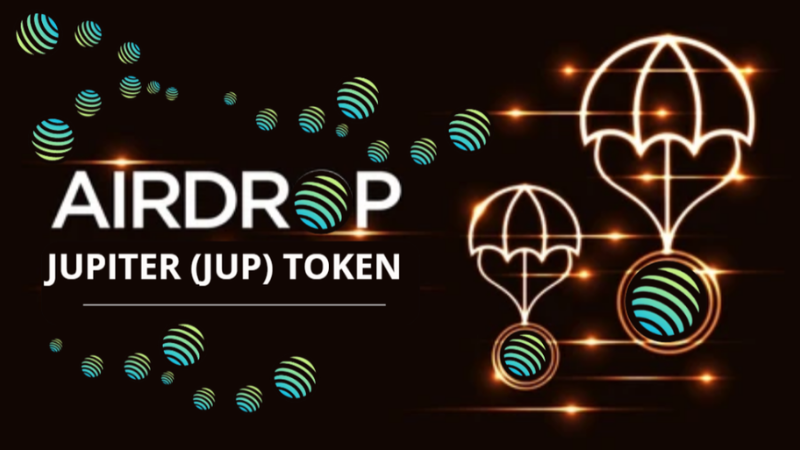Jupiter, the leading liquidity aggregator on the Solana ecosystem, has officially launched the JUP token and rolled out its airdrop campaign on January 31, 2024. This is the biggest token launch of the year, with nearly a million eligible Solana wallets expected to participate. The Jupiter Launches Airdrop promises to bring a great opportunity to receive free tokens for the user community. The goal of the campaign is to encourage interaction and foster long-term community growth. Let’s learn how to participate and claim your JUP tokens today with Financial Insight Daily!
Overview of Jupiter Airdrop
Introduction to Jupiter Airdrop
Jupiter Launches Airdrop is a free distribution campaign for JUP tokens by Jupiter, the largest liquidity aggregator on the Solana ecosystem. The airdrop officially began at 10:00 AM ET (equivalent to 22:00 Vietnam time) on January 31, 2024. This is one of the most notable airdrops of the year and is expected to attract Solana community participation, with nearly 955,000 eligible wallets.
JUP tokens will be distributed for free to users who have interacted with the Jupiter protocol before November 2, 2023, the snapshot date to determine eligible participants.

Who Will Receive JUP Tokens
The JUP airdrop will be distributed to 955,000 eligible Solana wallets. These wallets are determined by the users who have interacted with the Jupiter protocol before November 2, 2023, when the snapshot was taken to identify eligible participants.
Requirements to Receive JUP:
- You need to have used or interacted with the Jupiter protocol before November 2, 2023.
- The airdrop eligibility checker tool developed by Jupiter will help you confirm whether your wallet is eligible and how many JUP tokens you can claim.
How to Check Airdrop Eligibility
Jupiter provides an online tool to check eligibility for the airdrop by simply entering your Solana wallet address. The tool will provide detailed information about whether your wallet is eligible for JUP tokens and the amount you will receive.
Steps to Check Eligibility:
- Access the Jupiter airdrop eligibility checker tool.
- Enter your Solana wallet address in the required field.
- The tool will provide details on your eligibility and the number of JUP tokens you will receive.
Airdrop Token Distribution Breakdown
JUP tokens will be distributed based on three main criteria:
- 20% of the total airdrop will be evenly distributed among all eligible wallets. This means that each eligible wallet will receive an equal share of JUP tokens.
- 70% of the remaining tokens will be distributed based on a points system. These points are calculated based on the user’s level of interaction with the Jupiter protocol, including factors like:
- Frequency and volume of transactions on Jupiter.
- Participation in Jupiter-linked protocols or dApps.
- Engagement with the Jupiter community, including participation in events, promotions, and more. This means the more a user interacts with the Jupiter platform, the more JUP tokens they will receive.
- 10% of the tokens will be reserved for community members and developers who have significantly contributed to the development of the Jupiter project. This includes developers who built tools, apps, or services supporting the Jupiter protocol, as well as community members who actively promote and grow the project.

Details About the JUP Token
Jupiter, the top liquidity aggregator on Solana, has officially launched the JUP token and started the airdrop campaign on January 31, 2024. The total maximum supply of JUP tokens is 10 billion. Of this, 50% (5 billion) will be distributed to the community through airdrops and other initiatives.
JUP Token Distribution:
- 4 billion JUP tokens will be distributed across four airdrop rounds, with each round offering 1 billion tokens.
- 1 billion JUP tokens have been allocated for the initial token claim on January 31, 2024.
- Another 1 billion JUP will be reserved for contributors and community supporters. The timeline for these initiatives is yet to be announced.
- The remaining 5 billion JUP tokens will be kept for future token needs and the development team, including liquidity pools. The Jupiter team will not receive any tokens until January 2025, when a two-year vesting cycle begins.
How to Qualify for the JUP Airdrop
Jupiter DAO, one of the most dynamic and active communities in cryptocurrency, has announced plans for two additional JUP airdrops scheduled for 2025 and 2026. To qualify for these future airdrops, users need to take the following actions:
- Increase Trading Activity: Actively participating in trades on the Jupiter platform, including swaps and other transactions, will boost your chances of qualifying for future airdrop rewards.
- Participate in Staking and Governance Voting: Engaging in staking and participating in governance voting will be considered in the airdrop allocation process. This not only increases your chances of receiving rewards but also contributes to the growth of the Jupiter community.
- Use the Airdrop Eligibility Checker: Jupiter has launched an airdrop eligibility checker tool, allowing users to verify their qualification for upcoming airdrops. Using this tool will help you understand your participation level and what activities you need to do to increase your chances of receiving rewards.
- Pay Attention to Timing and Claiming Process: Once the airdrop events are launched, users will have a specific time window to claim their rewards. Keeping track of information from Jupiter and supporting exchanges will ensure you don’t miss out on claiming your rewards.

Jupiter Launches Airdrop is not only a fantastic opportunity to claim free JUP tokens but also a chance to become part of one of the most active communities in the Solana ecosystem. With long-term development plans and additional airdrops scheduled for 2025 and 2026, this campaign is sure to attract significant attention from cryptocurrency users. To qualify for the airdrop, actively participating in trading, staking, governance voting, and using Jupiter’s airdrop eligibility checker will be key steps to help you claim your rewards.
